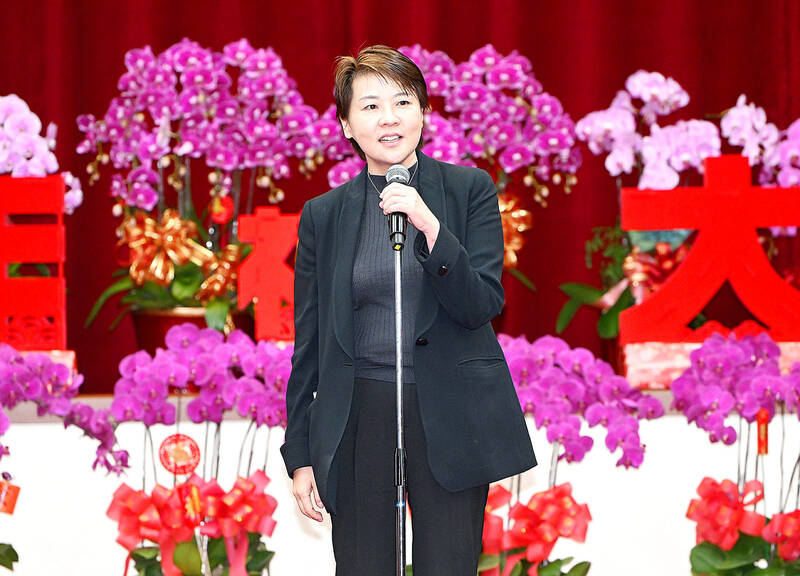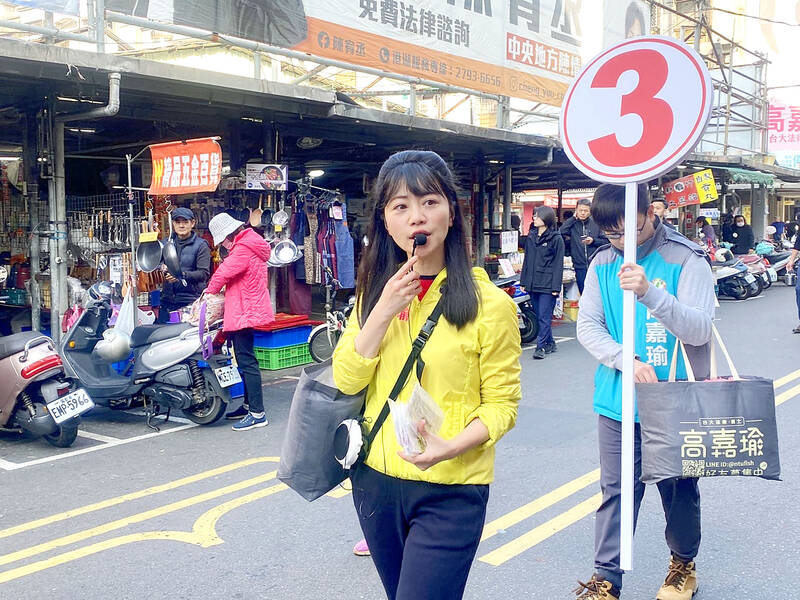In spite of the next local elections being over two years away, there is already considerable intrigue and jockeying for position by politicians and their supporters. The local press runs quite a bit of content, mostly speculative, on who will run in what races and what the outcomes might be. This is an overview for English language readers to get a taste of the state of play.
Four races in particular are drawing a lot of heat, those of mayors of New Taipei City, Taichung, Tainan and Kaohsiung because in all four the incumbent mayors will be term-limited out. In Taipei most are assuming that the popular Chiang Wan-an (蔣萬安) of the Chinese Nationalist Party (KMT) will win re-election, and though I think Taoyuan might be more in play than many think, most local commentators also seem to assume the KMT’s Simon Chang (張善政) will win re-election.
DPP INTERNAL JOSTLING FOR POWER

Photo: George Tsorng, Taipei Times
The Democratic Progressive Party (DPP) in some areas of the country had brutal battles fought between the factions in the May elections for heads of the local party branches as that gives the winner a bit more leverage, though by no means absolute as usually the party primaries are determined by public opinion polling. The leverage comes from having a bit more influence to try and convince potential candidates not to enter the primary, but they can not absolutely block any determined candidate.
The factions have now taken the battle to DPP National Congress taking place on July 21, and they will elect the 30-member Central Executive Committee, which in turn will elect five members of the 10-member Central Standing Committee. The party chair, secretary general, convener of the legislative caucus and DPP mayors of the big six metropolises are ex officio members of the Central Standing Committee, making up the other five committee members.
President and party Chair William Lai (賴清德) has dispensed with the carefully balanced appointment formula that his predecessor Tsai Ing-wen (蔡英文) had imposed to keep the peace between the factions and has packed the government with his loyalists and New Tide (新潮流系統, usually abbreviated to 新系) figures. This situation means that to stay relevant, the other factions had to do well in the local party chapter races and in the upcoming DPP National Congress.

Photo: Tien Yu-hua, Taipei Times
THE TPP’S UNIQUE STRATEGY
An interesting question is what state the Taiwan People’s Party (TPP) will be in in 2026. Historically it is around this number of electoral cycles, or one or two more, when third parties start to lose steam, and recently the TPP’s poll numbers have been shrinking. More importantly their disapproval numbers have spiked, in some polls to over 50 percent. Of course, the TPP could shake their current image of simply being the “little blue” sidekick of the KMT, regain a unique identity and revive their fortunes by then.
Strategically, the TPP is doing something very interesting and clever that as far as I know no other party has ever attempted. To make up for the problem of being a small party, all eight of the party’s legislators come from the party’s list of legislative candidates, and none represent electoral districts.

Photo: Taipei Times file photo
What this means in practice is that all eight will resign their seats in the legislature after two years, just in time to run in the local elections in 2026. In the meantime they will be trying to raise their profile and name recognition with the public. They have all also been designated a city, county or region to “represent” by setting up offices in these assigned areas and working hard to build knowledge and relationships.
When those eight step down, the next eight on the TPP’s party list will step up and take their place, and presumably also try and use their two years to raise their own profiles. Whether this unique strategy will ultimately work remains to be seen, but it is a clever way to leverage eight legislative seats into 16 opportunities for the party’s politicians to make their mark.
TAIPEI CITY
In Taipei, the KMT’s Chiang usually polls fairly high and is widely considered an attractive young man with a bright future. He will be tough to beat.
On the DPP side the one candidate openly considering a run is the similarly attractive and young Kao Chia-yu (高嘉瑜), who now is unemployed after losing her legislative seat after the Taiwan Statebuilding Party (TSP) ran a candidate, splitting the pan-green vote. The TPP will most likely run Vivian Huang (黃珊珊), who came in third in 2022, but with a respectable quarter of the vote.
NEW TAIPEI & TAOYUAN CITIES
In New Taipei City, the only party whose mayoral candidate is already probably known is the TPP’s Huang Kuo-chang (黃國昌), who has already indicated he will be in the race and the party has no other potential candidates who have the name recognition needed to beat him in a primary. He is also the party list legislator assigned to New Taipei City, and previously he had been elected to the legislature representing the New Power Party (NPP), though he only narrowly survived a recall attempt.
On the KMT side almost all of the buzz is around Lee Ssu-chuan (李四川), the perennial vice mayor, who served two terms in that role in New Taipei City, one in Kaohsiung and now in Taipei City. He has been downplaying the possibility, saying he needs to serve in Taipei and that there is plenty of local talent in the KMT in New Taipei City. The press is not buying this, as in Taiwan political culture it is customary if one has a current position to play coy and hard to get, then finally “reluctantly” be forced to run due to so much “pressure” to run by the public. However, if KMT party Chair Eric Chu (朱立倫), outgoing New Taipei Mayor Hou Yu-ih (侯友宜) or Taipei mayor Chiang object, he may not have much of a choice — but he has served as vice mayor to all three, so presumably they like and trust him.
If he does not run, there are quite a few potential candidates that have been floated, including current vice mayors, local lawmakers and ambitious city councilors. Viewed from here in Taichung, none of these candidates have stood out on the national stage, though they likely have local name recognition.
There are three clear frontrunners being bandied about on the DPP side. Two that have high name recognition are the former mayors of neighboring Taoyuan and Keelung, current head of the Straits Exchange Foundation and former vice premier Tseng Wen-tsan (鄭文燦) and former interior minister and current DPP secretary-general Lin Yu-chang (林右昌) respectively. Tseng is of the New Tide faction, while Lin’s faction is Taiwan Normal Country Promotion Association (TNCPA, 正常國家促進會, usually abbreviated to 正國會).
The third frontrunner is local lawmaker Su Chiao-hui (蘇巧慧) who in a recent poll by RW News had her coming in second place among legislators for leaving the “best impression” nationally. She is of the Su Tseng-chang faction (蘇貞昌系, usually abbreviated 蘇系), which might have something to do with the fact she is Su Tseng-chang’s daughter. In what was widely seen as a boost for her and blow for Lin Yu-chang, her only primary challenger to head the local DPP chapter, former lawmaker and entertainer Yu Tien (余天) of the TNCPA faction dropped out.
Credere Media has published the results of internal KMT polling, and it is very revealing about who the party thinks will ultimately be the candidates, and in both hypothetical matchups the KMT candidate was Lee Ssu-chuan. In one matchup, Lee got 33 percent, Su Chiao-hui 31 percent and Huang Kuo-chang 12 percent, and in another Lee got 35 percent, Lin Yu-chang 25 percent and Huang 13 percent.
If he is not chosen to run in New Taipei, Lin Yu-chang might be a good fit to run in Taoyuan to take on Simon Chang. Up to six local lawmakers have also been named as possibilities.
Unless a strong candidate appears sometime between now and 2026, the TPP might be wise to skip Taoyuan and put their resources elsewhere in races that are more viable. Their 2022 candidate, then-lawmaker Lai Hsiang-ling (賴香伶), only barely topped 5 percent.
Donovan’s Deep Dives is a regular column by Courtney Donovan Smith (石東文) who writes in-depth analysis on everything about Taiwan’s political scene and geopolitics. Donovan is also the central Taiwan correspondent at ICRT FM100 Radio News, co-publisher of Compass Magazine, co-founder Taiwan Report (report.tw) and former chair of the Taichung American Chamber of Commerce. Follow him on X: @donovan_smith.

Taiwan has next to no political engagement in Myanmar, either with the ruling military junta nor the dozens of armed groups who’ve in the last five years taken over around two-thirds of the nation’s territory in a sprawling, patchwork civil war. But early last month, the leader of one relatively minor Burmese revolutionary faction, General Nerdah Bomya, who is also an alleged war criminal, made a low key visit to Taipei, where he met with a member of President William Lai’s (賴清德) staff, a retired Taiwanese military official and several academics. “I feel like Taiwan is a good example of

March 2 to March 8 Gunfire rang out along the shore of the frontline island of Lieyu (烈嶼) on a foggy afternoon on March 7, 1987. By the time it was over, about 20 unarmed Vietnamese refugees — men, women, elderly and children — were dead. They were hastily buried, followed by decades of silence. Months later, opposition politicians and journalists tried to uncover what had happened, but conflicting accounts only deepened the confusion. One version suggested that government troops had mistakenly killed their own operatives attempting to return home from Vietnam. The military maintained that the

Jacques Poissant’s suffering stopped the day he asked his daughter if it would be “cowardly to ask to be helped to die.” The retired Canadian insurance adviser was 93, and “was wasting away” after a long battle with prostate cancer. “He no longer had any zest for life,” Josee Poissant said. Last year her mother made the same choice at 96 when she realized she would not be getting out of hospital. She died surrounded by her children and their partners listening to the music she loved. “She was at peace. She sang until she went to sleep.” Josee Poissant remembers it as a beautiful

Before the last section of the round-the-island railway was electrified, one old blue train still chugged back and forth between Pingtung County’s Fangliao (枋寮) and Taitung (台東) stations once a day. It was so slow, was so hot (it had no air conditioning) and covered such a short distance, that the low fare still failed to attract many riders. This relic of the past was finally retired when the South Link Line was fully electrified on Dec. 23, 2020. A wave of nostalgia surrounded the termination of the Ordinary Train service, as these train carriages had been in use for decades